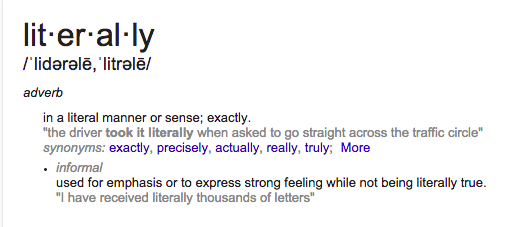Defying the Dictionary

Literally, as defined by Google.
October 13, 2014
Throughout history, each generation of young people has created its own definition of culture. By challenging the restrictive expectations of their parents, our modern society has been shaped by the rebellion of youth. The teens of the 1950’s embraced rock and roll, the young hippies of the 60’s wore tie-dye, and the children of the 1980’s had really big hair. But what has our generation done to fundamentally alter society? How has today’s urban youth contributed to this grand tradition of rebellion?
The young people of the twenty-first century have fundamentally altered our society by being ignorant to the real definition of words. They no longer prescribe to the antiquated view of their parents that a word should actually have a concrete definition. When confronted by dictionaries, teenagers stand up for their God-given right to not make any sense to anyone over thirty-five. This generation of dreamers looks to a future where a word is not defined based on its actual meaning, but on its conversational context. When this phenomenon is studied in the coming centuries, historians will look at one word that literally started it all. That word is literally. In the dark ages, this word would literally mean “without exaggeration or inaccuracy.” I myself am an urban youth and have literally never heard it used that way. Like literally never. Back in the repressive twentieth century, literally would be used to imply that something being described was not figurative, but literal. Nowadays, literally could mean either figuratively or literally depending on the speaker. To someone who is not an urban youth, this might sound literally ridiculous. To these naysayers, teenagers around the country say, “literally stop” (translation: you are standing in the way of social progress and also you are old). Adolescents today also tend to frequently employ the word “like.” At first, this does not seem like social progress, exactly the opposite, but consider the following statement: “The brown dog ate the food.” As a reader do you not feel that this sentence is a bit abrasive? What if I don’t want the dog to be brown? What if I don’t want the dog to eat the food? Now add a few likes into it and you get “the like brown dog like ate the food.” Does this sentence not feel more inviting? Maybe the dog is brown and maybe he isn’t; maybe the dog ate the food and maybe he didn’t. In an increasingly interconnected world, we cannot continue to build restrictive walls around ourselves or our dogs. The twenty-first century will be one of change, which we, the youth of the twenty-first century, refuse to clearly define.













Paula • Oct 21, 2014 at 1:56 pm
Sophie, your intelligence and humor are very much appreciated. An amazing piece! Love this (and you!) 🙂
Julia Matthews • Oct 13, 2014 at 9:00 pm
this made me (literally) laugh out loud. thanks for the dash of satire sophie!
Sarah Burgess • Oct 13, 2014 at 7:37 pm
Oh my god Sophie you are LITERALLY the best human being on the EARTH!!! This article like speaks to me on like a spiritual level. I’m not kidding I like literally don’t understand how people could like use the word “literally” meaning like “without exaggeration”?????? What does that like even mean??? Anyway you are like my hero literally.